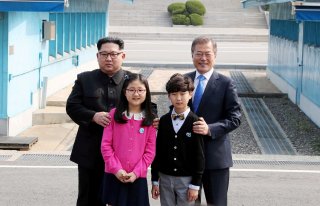Time for a Korean Solution to Ending the Korean War
Ultimately, there need be a Korean solution to the Korean divide, but the international community can cooperate and coordinate to the Peninsula’s benefit. By doing so, the international community would help mend the tragic rifts of the twentieth century, would help lay division to rest, and would meaningfully contribute to a more stable and prosperous Korean Peninsula by the year 2025.
Editor's Note: As the world commemorates the 70th anniversary of the start of the Korean War, the Center for the National Interest’s Korean Studies team decided to ask dozens of the world’s top experts a simple question: Do you believe that the Korean War will finally come to an end before its next major anniversary in 2025? The below piece is an answer to that question. Please click here to see even more perspectives on this important topic.
The anniversary of the start of the Korean War, which commenced in 1950, has given us cause to work not only in general to end war’s destruction, but also work toward the integration of, unification of, and reconciliation of the Korean Peninsula. This tragic divide separated a nation and has stood too long as the last vestige of the Cold War. Its 75 year anniversary in 2025 should see an accompanying commitment to the end of war on the Peninsula and to a process aimed at trust-building, both on the Peninsula and off. A peace mechanism in place by 2025 would advance the prospects and arrangements for Korean integration.
Key to getting there, though, is North Korean acceptance of South Korean efforts toward inter-Korean reconciliation. The two Koreas have been in a unification tunnel for two decades, but to realize light at the end of it requires openness to Seoul’s overtures on the part of Pyongyang. Seoul, for its part, must provide assurances that it wishes to integrate peacefully and with respect and inclusion for the people of North Korea. This ‘two kingdoms’ period or ‘one nation, two systems’ status quo may persist, but to ease financial and social costs requires benevolence and commitment on both sides.
So too do the United States and other regional actors need to engage in trust-building. They, through international financial institutions, the UN, and independent investors, must strike at ways of easing the burden on the Korean Peninsula by investing in infrastructure, energy, food security, agriculture, labor, education, demilitarization, as well as nuclear safety and dismantlement. There are real development needs north of the DMZ, and they present a challenge not seen since the end of the war, akin to post-war European reconstruction in scope, with costs exceeding.
Ultimately, there need be a Korean solution to the Korean divide, but the international community can cooperate and coordinate to the Peninsula’s benefit. By doing so, the international community would help mend the tragic rifts of the twentieth century, would help lay division to rest, and would meaningfully contribute to a more stable and prosperous Korean Peninsula by the year 2025.
Stephen Noerper is Senior Director for Policy at The Korea Society (TKS), both an Adjunct Professor at Columbia University and a Senior Research Scholar at its Weatherhead East Asian Institute (WEAI), is Senior Advisor to the UN Department of Political and Peacebuilding Affairs’s (DPPA) Programme to Support Cooperation in Northeast Asia, and is a Member of the National Committee on North Korea . You can follow him on Twitter @SNoerper.

